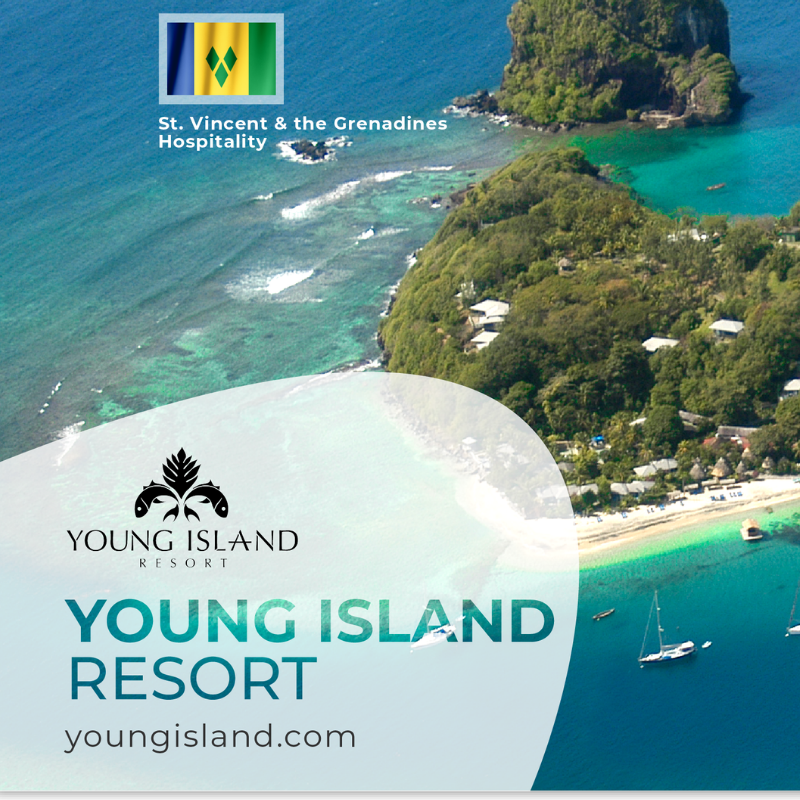Who
Young Island Resort
https://youngisland.com/
Country
St. Vincent and the Grenadines
Sector
Hospitality
IMMEDIATE IMPACT
Product Development
Reduced Operational Costs/Wastage
Reduction in Energy Costs/Consumption
MID-TERM IMPACT
Increase in revenue/sales – 16%
Increase in staff – 4%
Increase in exports -5%
Decrease in operating expenses and/or wastage – 63%
Profile
The Young Island Resort is a fifty-two-year-old establishment with twenty-nine cottage-styled accommodations, located on a 12.6 acres private island in St. Vincent and the Grenadines.
The Issue
Young Island Resort needed to reduce the cost of doing business; modernise the Resort; and improve the delivery of its services. The Resort also wanted to increase website traffic and occupancy rates; and enhance their menu and pastry offerings to compete more effectively and become more viable as a business.
Assistance Received
Young Island Resort received a financial grant under the Direct Assistance Grants Scheme (DAGS) in 2018 funded by the European Union under the 11th EDF Regional Private Sector Development Programme.
The company undertook a multi-faceted and expansive project to improve and enhance the Resort’s product delivery, services, and aesthetics. Renewable energy measures including the purchase of an AC inverter, solar water heaters and low and low flow shower heads for all bathrooms were implemented, to reduce energy costs and carbon footprint. In addition, capacity building in the form of staff training, specifically in pastry and international cuisine; menu development and costing; product marketing and promotional materials production; and the acquisition of furnishings and service delivery software and hardware were also undertaken to increase customer satisfaction.
Immediate Impact
At the close of the DAGS project in 2018, the Resort reported that it had achieved its objectives in enhancing its facilities and service delivery. Greater energy efficiency was achieved because of the installation of AC inverters and the resort now utilises natural energy to operate. The Resort is also now able to monitor electricity cost to measure savings because of new solar water heaters. In addition, the installation of low flow shower heads resulted in less water wastage and positive guest feedback on the new fittings.
Ten (10) staff who were trained by Jennifer Lakhan-D’Souza- George Brown College, Canada, in pastry making, are now certified and new pastry items are currently on the menu. Also, chefs and accounts staff members (four females and six males) were trained in culinary areas of costing, menu development, production, and sanitization, by Kevin Mitchell- Culinary Institute of Charleston- South Carolina, USA.
The Resort has also produced a new promotional video, which is utilised in roadshows and travel and trade shows. Flyers and ten thousand (10,000) brochures were developed and are now available at the Resort’s reservation agencies in the UK, USA, and Canada. This promotional material has assisted the Resort in penetrating new markets and attracting more guests from the Caribbean, Europe, USA, and Canada.
The kitchen equipment purchased provides safe and healthy meals to guests, the additional laundry washers acquired have led to increased capacity and efficiency, and the acquisition of twelve (12) beds have increased customer satisfaction. The Resort has also implemented a smoother workflow in the housekeeping department which has improved service delivery to guests. In addition, new point of sale software and hardware have led to enhanced staff accountability and expedited kitchen orders, productivity has improved, and the inventory system has led to greater operating efficiencies.
At the close of the project, it was expected that the immediate gains realised by the company would further result in longer term outcomes and impact of increased exports of 5% and increased staff of 4%.
Medium-term Results and Impact
Over the medium-term, the Resort increased its revenue and sales (which included export sales) by 16%. Moreover, Young Island Resort has experienced cost savings, with a 63% reduction in its water bill from 2018-2019. The Resort began seeing an increase in business from January-March 2020, since implementation of the DAGS project. Non-resident business continues to thrive with repeat guests, which could be attributed to the new food items and menu presentation. Media coverage led to increased visibility for the Resort and customer interest in the new pastry items. The Resort also hired an additional pastry staff, however, due to the COVID-19 pandemic the staff was subsequently laid off.
“The Resort can only grow from strength to strength now, in terms of the momentum that we have started. And I must say…that the point-of-sale system…that sort of energized our bar and restaurant staff […] I am really, really, very happy and I certainly would endorse a DAGS at any time […] I speak positively about it to anyone […] you know, just saying thanks…†Bianca Porter, General Manager.
